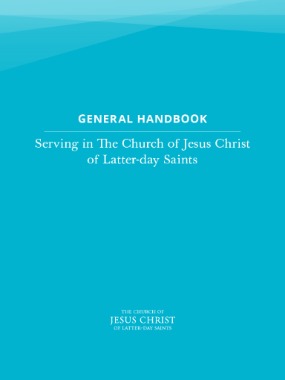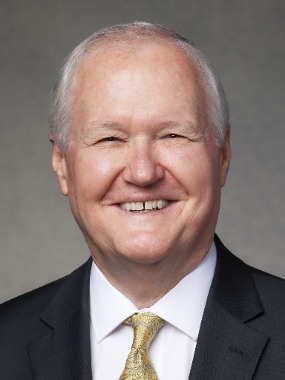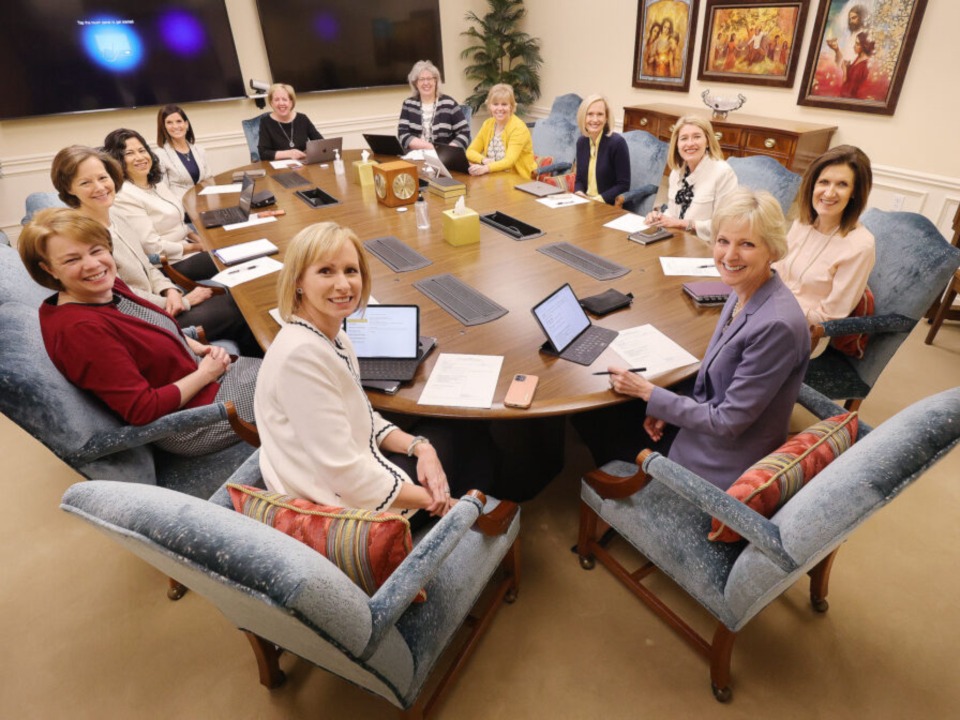
Words-1.png
The new digital-only General Handbook replaces Handbook 1 (for stake presidents and bishops) and Handbook 2 (for all other leaders) and is being revised under the direction of the First Presidency and Quorum of the Twelve Apostles. © 2021 by Intellectual Reserve, Inc. All rights reserved.
This story appears here courtesy of TheChurchNews.com. It is not for use by other media.
By Sydney Walker, Church News
According to previous Church handbooks, one of the responsibilities of a Relief Society compassionate service leader was to care for the poor and needy.
Neither the term “compassionate service leader” nor “care for the poor and needy” is found in the new General Handbook: Serving in The Church of Jesus Christ of Latter-day Saints.
Those terms have been replaced by “service coordinator” — for both Relief Society and elders quorums — and “caring for those in need,” respectively.
Though small, these and other changes in terminology in the revised handbook are significant, said Elder Anthony D. Perkins, General Authority Seventy and Executive Director of the Church’s Correlation Department, which oversees the handbook.
The new digital-only handbook replaces Handbook 1 (for stake presidents and bishops) and Handbook 2 (for all other leaders) and is being revised under the direction of the First Presidency and Quorum of the Twelve Apostles.
Whereas previous handbooks were written in an administrative, procedural voice for Church leaders, the General Handbook — available to the public and written for a global Church — aims to be more principle based. Content has been simplified, reduced and made more adaptable for congregations of all sizes worldwide.

“One of the principles the First Presidency gave us direction on from the beginning is what we’ve called using a more ministerial voice,” Elder Perkins said. “Almost every chapter, almost every procedure, has a scripture related to it. … So in the language we choose, let’s use language, if we can, that the Savior used in the scriptures.”
The term “caring for those in need,” for example, is more ministerial and less categorical than “caring for the poor and needy,” he said. “We’re not labeling them as poor; we’re not labeling them as needy. We’re calling them ‘a person in need,’ and that need can be anything.”
As of August 2021, 30 of the General Handbook’s 38 chapters have been fully updated in English. The final eight chapters are expected to be released in English by the end of the year, with other languages to follow.
Elder Perkins highlighted several terminology changes within these revised chapters.
General wording changes
The new handbook is organized around the four divinely appointed responsibilities in the work of salvation and exaltation: Live the gospel of Jesus Christ, care for those in need, invite all to receive the gospel, and unite families for eternity.
“We wanted to really make those words feel doable, even to the newest member in Botswana,” Elder Perkins said of “live, care, invite and unite.”
Previous handbooks used the word “auxiliary” to refer to the Sunday School, Primary, Relief Society, Young Women and Young Men. “Auxiliary” can connote secondary or supplemental. That word has been changed to “organization,” which better represents the integral role these groups have in the Church, Elder Perkins said.

These organizations at the general level often call a group of individuals to assist them. The term “general board” has been changed to “advisory council,” which better describes the role these leaders play in advising those they serve with. In contrast to “board,” “council” is doctrinally significant and shows that these leaders work together to receive revelation.
Newly called Primary General President Camille N. Johnson spoke about this in a recent Church News series on councils: “These are not board meetings, where directions are given to executives to fulfill certain responsibilities or directives. Not at all. It’s a revelatory experience to identify what the Savior has in mind for His Church.”
The revised handbook also includes some changes to names of stake committees to better reflect the committees’ goals.
“Aaronic Priesthood–Young Women Committee” has been changed to “Youth Leadership Committee,” and “Stake Melchizedek Priesthood Committee” has been changed to “Stake Adult Leadership Committee” and now includes both men and women.
“Activation” and “retention” have been changed to “strengthening new and returning members,” which more clearly communicates the active roles that members have in these aspects of the work.
Repentance and Church membership council terms
The language in Chapter 32: Repentance and Church Membership Councils was adjusted to have a more ministerial tone and be more precise and clear. Terminology that had a legalistic tone was removed.
For example:
- “Probation” has been changed to “membership restrictions.”
- Terms such as “jurisdiction” and “investigation” have been removed.
- “Discipline” has been changed to “restrictions.”
- “Disciplinary council” has been changed to “membership council.” (The term “disciplinary council” presumed a need for discipline before the council had been held.)
- “Disfellowship” has been changed to “formal membership restrictions.” (“Disfellowship” connotes shunning and withholding fellowship, which is contrary to the intent of the action taken.)
- “Excommunication” has been changed to “withdrawal of membership.”
A new introduction to the chapter outlines the doctrine of repentance. “The desire there was to make sure that the emphasis is on repentance — not discipline,” Elder Perkins said.
President Russell M. Nelson taught in the April 2019 general conference: “Too many people consider repentance as punishment — something to be avoided except in the most serious circumstances. But this feeling of being penalized is engendered by Satan. He tries to block us from looking to Jesus Christ, who stands with open arms, hoping and willing to heal, forgive, cleanse, strengthen, purify, and sanctify us. …
“Repentance is not an event; it is a process. It is the key to happiness and peace of mind. When coupled with faith, repentance opens our access to the power of the Atonement of Jesus Christ.”
Missionary terms
The terms “proselyting missionary” and “Church-service missionary” are no longer used in the handbook. Instead, the term “missionary” is used to refer to anyone who has received a call to serve.
“We’re trying to avoid some stigma of the kind of mission you serve. What’s important is you serve the Lord,” Elder Perkins said.

Where necessary, “service missionary” is used to refer to missionaries who live at home and serve under the direction of the stake president. Also where necessary, “young teaching missionary” is used to refer to young missionaries who serve away from home. In some cases, “young” and “senior” are used as qualifiers to help clarify policies.
Self-reliance terms
In addition to the new phrase “caring for those in need” — which is used throughout Chapter 22: Providing for Temporal Needs and Building Self-Reliance — the term “welfare assistance” has been changed to “Church assistance.” The word “welfare” can have a negative connotation and is confusing for some translations.
“Emergency preparedness” has been broadened to “temporal preparedness” so it includes other elements, such as financial, emotional and food storage preparedness.
Other terminology
Elder Perkins also highlighted some terminology often used in Church culture that is not in the handbook or the scriptures. Such terms can lead to doctrinal misunderstanding.
“As the Lord teaches in Doctrine and Covenants 82:8, He wants all to understand His will concerning us. Talking about gospel truths in the way He and His prophets talk about them can help us gain a better understanding of eternal truth and avoid unintended misperceptions,” Elder Perkins said.

Some Latter-day Saints use the phrase “take out your endowments” when going through the temple for the first time. “We don’t take out our endowments. We receive our endowment,” he said, emphasizing the word “receive” and singular “endowment.”
Another example is “free agency,” a term not found in the scriptures. “You’re free to choose, which is agency,” Elder Perkins said, “but the only time agency has an antecedent is in the Doctrine and Covenants where it says ‘moral agency,’ … [which means] choosing between right and wrong.”
The word “doctrine” when referring to Church doctrine should not be pluralized, Elder Perkins said. “President Nelson has pointed out to us that in the scriptures, every time ‘doctrines’ is plural, it’s the doctrines of men or the doctrines of devils. When it’s the singular, it’s the doctrine of Christ.” A plural option for doctrine could be “points of doctrine.”
The phrase “I invite you …” is one which the prophets and apostles use in favor of “I challenge you …” when encouraging others to come to the Savior.
“Challenge is a very confrontational, almost conflicting word, and it’s not found in the scriptures,” Elder Perkins said. In “Preach My Gospel,” the terminology is “invite” someone to be baptized, not “challenge” them to be baptized. An invitation gives someone the chance to exercise their agency.
And finally, the term “Area Authority” is outdated. Area Authorities were called for a brief time in the 1990s, but today they are called Area Seventies. Chapter 5: General and Area Leadership was written to help members understand the roles of General Authority Seventies, Area Seventies, Area Presidencies and General Officers, Elder Perkins said.
The General Handbook is available on ChurchofJesusChrist.org and in the Gospel Library app.
Copyright 2021 Deseret News Publishing Company